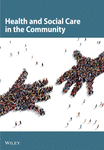Supporting carers: is practice still sexist?
Abstract
Informal carers are central to the community care policies which have emerged during the last two decades. However, research has suggested that caring is a gendered activity, disproportionately expected of women with consequent disadvantage in terms of physical and mental health and material well-being. Moreover, evidence has been presented that, in the past, women carers were less likely to be offered the support of public services than their male counterparts. A research project designed to test whether this pattern still applied in service provision to male and female spousal carers was carried out in an assessment and care management team working with older people. The results suggested that differences in professional responses to female and male carers still persist and that some workers may be unaware of the gap between their intentions and their actions in assessing and planning services. This evidence implies the need for further attention to be paid to these issues in training care managers and the importance of monitoring the outcomes of assessment along gender lines.




